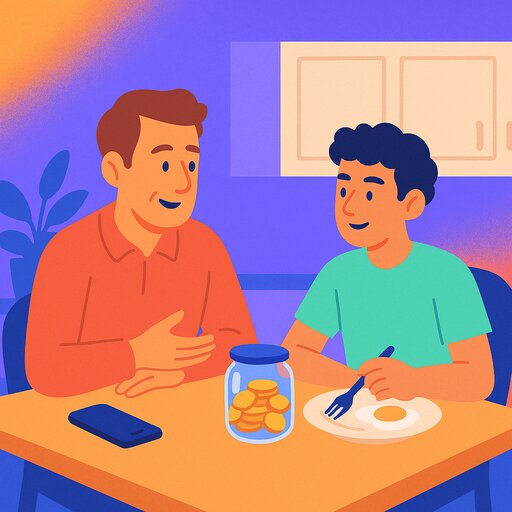Stop me if this sounds familiar: you finally convince your teen to do the dishes and within minutes their phone buzzes. Suddenly the plate is forgotten and their thumbs are glued to a screen. In Toyoake, a small city in central Japan, the mayor decided he’d had enough. On 1 October the city rolled out a set of guidelines asking residents to limit total smartphone and tablet use to two hours a day, turn off devices by 9 p.m. for kids and 10 p.m. for teens and adults, and use the extra time to talk, read and, yes, finish chores【989578813724679†L38-L60】. There are no fines and no police, just a nudge to families to discuss why endless scrolling might not be healthy【989578813724679†L82-L88】.
Critics outside Japan laughed at the idea of a local government policing personal devices, but Toyoake isn’t enforcing anything. Its leaders say they want to spark conversations at dinner tables, not in courtrooms. The guidelines were proposed after teachers reported that sleep‑deprived students were distracted and irritable. By suggesting a two‑hour cap, the mayor hoped parents would reflect on their own habits and help their children carve out screen‑free evenings. Some residents have already embraced the change—one high‑schooler swapped TikTok for comics; another family now eats together instead of eating in front of separate screens. Like any new routine, it takes practice, but the spirit of the ordinance is rooted in family connection【989578813724679†L38-L60】.
There’s science to back up Toyoake’s intuition. A recent study by Sapien Labs tracked more than 100,000 people and found that owning a smartphone before age 13 correlates with higher rates of anxiety, aggression, feelings of detachment and low self‑worth in early adulthood【866271743895166†L150-L190】. The researchers warned that unsupervised access to social media and the constant hum of notifications disrupt sleep, expose kids to bullying and erode family relationships【866271743895166†L150-L190】. They urged policymakers to introduce digital literacy courses and restrictions on smartphones for minors【866271743895166†L190-L213】. Several countries have already banned or limited phones in schools, and New York plans to follow【866271743895166†L210-L215】. While a two‑hour limit isn’t a magic fix, it signals a growing recognition that screens alone aren’t harmless babysitters.
So what does this mean for parents juggling work, chores and teens who seem surgically attached to their devices? Instead of fighting technology, use Toyoake’s story as a prompt to reset habits at home. Set a family rule that screens go off after dinner, then fill the evening with shared tasks—cooking, tidying, balancing the budget together. Explain to your teen that doing the laundry or saving for a goal isn’t punishment; it’s a path to independence and well‑being. Model healthy digital behaviour yourself by leaving your phone in another room during conversations. When we assign chores and talk about money, we teach our children that life happens beyond a scroll. A city half a world away may have issued the two‑hour challenge, but it’s up to us to make sure our homes are the places where connection comes first.
## **المحتوى باللغة العربية**
جرب تقول لابنك يغسل المواعين، وفجأة تلاقي الموبايل بيرن وكل حاجة بتتبخر. في مدينة تويوأكي الصغيرة بوسط اليابان، العمدة قال «كفاية كده». في ١ أكتوبر طلعت المدينة إرشادات بتطلب من السكان يحدوا استخدام الموبايل والتابلت لساعتين في اليوم، ويقفلوا الأجهزة الساعة ٩ مساءً للأطفال و١٠ مساءً للمراهقين والكبار، ويستخدموا الوقت ده للكلام والقراءة وإنجاز شغل البيت【989578813724679†L38-L60】. مفيش غرامات ولا شرطة، مجرد دعوة إن العائلات تتناقش عن ليه التمرير اللانهائي مش صحي【989578813724679†L82-L88】.
الناس بره اليابان استغربت فكرة إن الحكومة تدخل نفسها في موضوع الموبايل، لكن تويوأكي مش بتطبق عقوبات. القادة بيقولوا إنهم عايزين يولعوا شرارة نقاشات على السفرة، مش في المحاكم. الإرشادات جات بعد ما المدرسين لاحظوا إن الطلاب بيتعبوا ومش مركزين بسبب السهر. العمدة حط حد الساعتين عشان الأهل يراجعوا عاداتهم ويساعدوا أولادهم يطفوا الشاشات قبل النوم. بعض السكان فعلاً بدأوا ينفذوا الفكرة؛ طالب ثانوي استبدل تيك توك بالقصص المصورة، وأسرة بقت تتعشى سوا بدل ما كل واحد قاعد قدام شاشة【989578813724679†L38-L60】. زي أي عادة جديدة، الموضوع محتاج تدريب، لكن روح القرار كلها بتشجع الترابط العائلي.
العلم بيأكد إحساس تويوأكي. دراسة حديثة من سايبيان لابز شملت أكتر من ١ ٠٠ ٠٠٠ شخص ولقوا إن امتلاك موبايل قبل سن ١٣ مرتبط بمعدلات أعلى من القلق والعدوانية والشعور بالانفصال وانخفاض تقدير الذات في الشباب【866271743895166†L150-L190】. الباحثين حذروا إن الوصول غير المراقب للسوشيال ميديا والتنبيهات المستمرة بيخرب النوم وبيعرض الأولاد للتنمر وبيضعف العلاقات الأسرية【866271743895166†L150-L190】. طالبوا الحكومات بتدريس مهارات التعامل مع التكنولوجيا وفرض قيود على الموبايلات للأطفال【866271743895166†L190-L213】. في بلاد كتير منعت الموبايلات في المدارس، وولاية نيو يورك ناوية تعمل كده قريب【866271743895166†L210-L215】. حد الساعتين مش حل سحري، لكنه علامة إن العالم بدأ يفهم إن الشاشة مش جليسة أطفال آمنة.
إحنا كآباء وأمهات، نقدر نستفيد من التجربة دي بدل ما نتخانق مع التكنولوجيا. حطوا قاعدة في البيت إن الموبايلات تتقفل بعد العشاء، واملأوا الوقت بتعاون: طبخوا مع بعض، رتبوا البيت، أو حتى اعملوا ميزانية الأسرة سوا. اشرح لابنك إن غسل الملابس أو التوفير مش عقاب؛ دي خطوة نحو الاستقلال والصحة النفسية. وريه مثال بنظامك أنت: سيب الموبايل في أوضة تانية وقت الكلام. لما ندي أولادنا مسئوليات ونتكلم عن الفلوس، بنتعلمهم إن الحياة مش كلها شاشة. المدينة اليابانية اللي على بعد آلاف الكيلومترات قدمت لنا تحدي الساعتين، لكن إحنا اللي نقدر نخلي بيوتنا أماكن فيها التواصل أهم من أي تطبيق.
## Sources
– TIME: “The Japanese city limiting its residents to two hours of screen time a day” (Oct 2025).
– News‑Medical: “Early smartphone use linked to poorer mental health in young adults” (Jul 2025).







Leave a Reply
You must be logged in to post a comment.